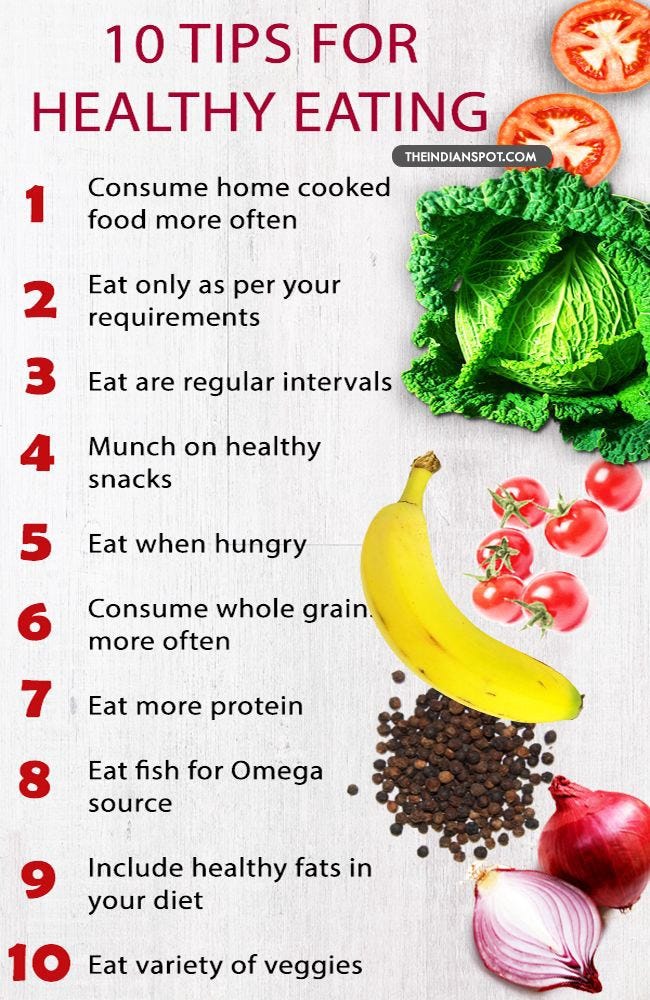Healthy Eating Habits: Tips for Making Balanced Food Choices
Nourishing Your Body: Tips for Making Balanced Food Choices
Introduction: In today's fast-paced world, where convenience often takes precedence over health, maintaining balanced eating habits can feel like a daunting task. However, making mindful food choices is essential for promoting overall well-being and vitality. Balanced nutrition not only provides the body with essential nutrients but also supports optimal physical and mental function. In this article, we'll explore practical tips for cultivating healthy eating habits and making balanced food choices that nourish your body and mind.
Understanding Balanced Nutrition:
Balanced nutrition involves consuming a variety of foods from all the major food groups in appropriate proportions to meet your body's nutritional needs. These essential nutrients include carbohydrates, proteins, fats, vitamins, minerals, and water. Each nutrient plays a unique role in supporting various bodily functions, from providing energy to supporting immune health and promoting cell repair and growth.
Tips for Making Balanced Food Choices:
Emphasize Whole, Unprocessed Foods: Base your diet around whole, unprocessed foods such as fruits, vegetables, whole grains, lean proteins, and healthy fats. These nutrient-dense foods are rich in vitamins, minerals, fiber, and antioxidants, while low in added sugars, sodium, and unhealthy fats.
Fill Half Your Plate with Fruits and Vegetables:
Aim to fill at least half of your plate with a colorful array of fruits and vegetables at each meal. These plant-based foods are packed with vitamins, minerals, and phytonutrients that support overall health and reduce the risk of chronic diseases.
Choose Lean Protein Sources:
Incorporate lean protein sources into your meals, such as poultry, fish, tofu, legumes, and low-fat dairy products. Protein is essential for building and repairing tissues, supporting muscle health, and promoting satiety.
Opt for Whole Grains:
Choose whole grains such as brown rice, quinoa, oats, barley, and whole wheat bread and pasta over refined grains. Whole grains are higher in fiber and nutrients, which help regulate blood sugar levels, promote digestive health, and keep you feeling fuller for longer.
Include Healthy Fats:
Incorporate sources of healthy fats into your diet, such as avocados, nuts, seeds, olive oil, and fatty fish like salmon and sardines. These fats provide essential fatty acids that support brain health, reduce inflammation, and absorb fat-soluble vitamins.
Practice Portion Control:
Pay attention to portion sizes to avoid overeating and maintain a healthy weight. Use visual cues such as the size of your palm or a deck of cards to gauge appropriate serving sizes for proteins, grains, and fats.
Limit Added Sugars and Processed Foods:
Minimize your intake of foods and beverages high in added sugars, refined carbohydrates, and unhealthy fats, such as sugary drinks, desserts, processed snacks, and fried foods. These empty-calorie foods provide little nutritional value and can contribute to weight gain and chronic diseases.
Stay Hydrated:
Drink plenty of water throughout the day to stay hydrated and support optimal bodily functions. Water is essential for digestion, nutrient absorption, temperature regulation, and the elimination of waste products.
Practice Mindful Eating:
Slow down and savor your meals by practicing mindful eating. Pay attention to the flavors, textures, and sensations of each bite, and listen to your body's hunger and fullness cues to prevent overeating.
Be Flexible and Enjoy Treats in Moderation:
Allow yourself the flexibility to enjoy occasional treats and indulgences in moderation without guilt. The key is to focus on balance and moderation rather than strict deprivation.
Conclusion:
Healthy eating is not about following rigid rules or restrictive diets but about nourishing your body with wholesome, nutrient-dense foods that support overall health and well-being. By incorporating these tips for making balanced food choices into your daily routine, you can empower yourself to create a sustainable and enjoyable approach to eating that fuels your body and enhances your quality of life. Remember, small changes can lead to significant improvements in your health over time, so start where you are and gradually build upon your progress towards a healthier, happier you.



Post a Comment